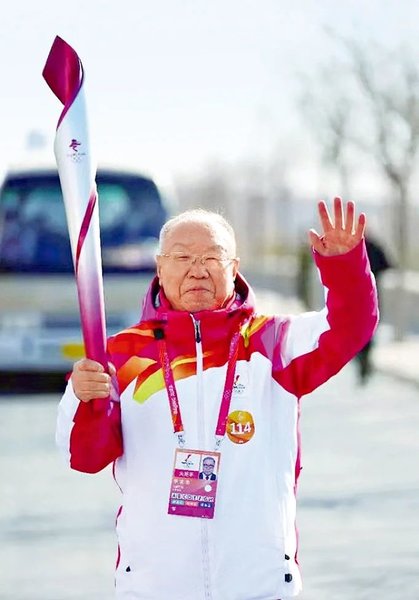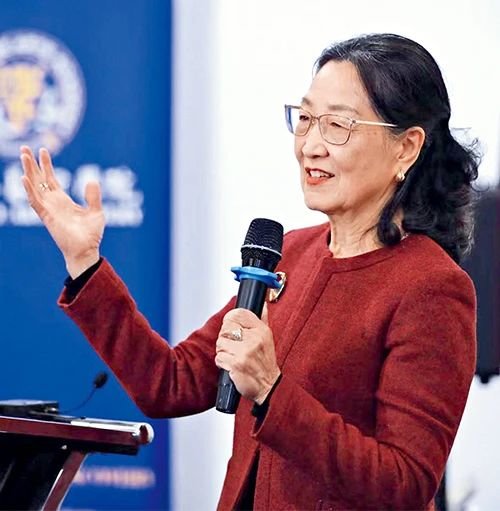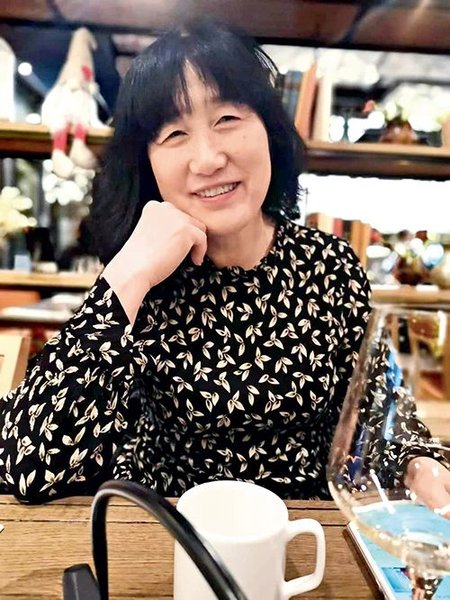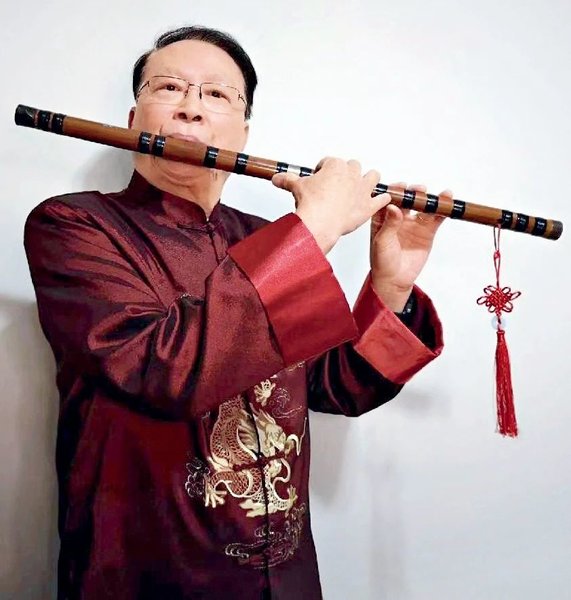My Chinese Heart | Growing Up with New China
This year marks the 75th anniversary of the founding of the People's Republic of China (PRC). During the past 75 years, generations of overseas Chinese have worked hard, and they have contributed their wisdom and strength to the development of their ancestral country, and to the development of their hometowns. In this article, four overseas Chinese, each same age as PRC, discuss their lives overseas, express their deep love for their hometowns and offer sincere wishes to China.

Li Wenzhong: Promoting TCM Culture in Argentina
During his 30-plus years in Argentina, Li Wenzhong developed now commonly used traditional Chinese medicine (TCM) to treat children's diseases, promoted the use of TCM at Argentinian hospitals, shared TCM culture in Argentina's university classrooms, and helped Argentinians better understand TCM culture. Li was born in Beijing in 1949. He once worked at Guang'anmen Hospital, in Beijing, and he eventually established his own, private hospital.
During the 1980s, as the reform and opening up policy swept across China, Li realized TCM had development prospects — and that some traditional Chinese herbs were being used to treat patients — in Argentina. So, he moved to Argentina.
In Buenos Aires, capital of Argentina, he opened a clinic, and he established a pharmaceutical enterprise. He used four basic TCM diagnostic methods (inspection, auscultation and olfaction, inquiry, and palpation), and he used herbal diets, acupuncture and moxibustion, massage and other therapies to treat patients. His medical skills gradually earned him a solid reputation, and many Argentinians sought him out for consultations and treatments.
During the 1980s, head lice was prevalent, especially among children. The commonly used medicines were short-acting, and they had significant side effects. Many people turned to Li, as they hoped he had a solution.
After months of research and experiments, Li developed a special kind of TCM to deal with head lice. The medicine was effective, and it quickly won the trust of Li's patients. That medicine quickly became the commonly used medicine for treating head lice in Argentina.
Li donated the medicine to schools, and to impoverished communities, in Argentina to prevent children from suffering from head lice. During the 1990s, Li became a visiting professor at Buenos Aires Medical University, where he taught classes in TCM culture.
Li has spared no effort in promoting cultural exchanges, especially those focused on TCM. Between 2012 and 2015, with Li's assistance, Argentina's Ministry of Health sent several delegations to China to discuss TCM cooperation between Argentina and China. "My career is closely related to the opening up and development of China. I feel honored to have done my part in helping boost TCM in going global," Li says.
"I sincerely wish the motherland prosperity and progress, with great strides. I hope to continue devoting myself to the cause of TCM international exchanges, and in helping TCM bloom and bear fruit in more places," he adds.

Chen Guosheng: Promoting People-to-People Exchanges
China's National Day is not just a national holiday for Chen Guosheng, tenured honorary scholar at Royal Melbourne Institute of Technology, as the day also bears special memories and emotions.
"I was born on October 1, 1949, the day of the founding ceremony of PRC. When I was a child, my father would mark this day on the calendar to remind us of the country's birthday, and also of my birthday. At that time, there would be fireworks in Beijing, and my family would take me to Tian'anmen Square to watch the fireworks. The splendid fireworks, the sea of people and the warm and cheerful atmosphere is impossible to forget," Chen says.
Chen moved to Nanjing, in east China's Jiangsu Province, when she was 10. There, she participated in various National Day activities organized by her school. "My spirit of collectivism and national pride were gradually cultivated during the activities. The activities not only made me feel the strength of our country, but also strengthened my feelings for the motherland," she says.
In 1984, the Education Department of Jiangsu Province dispatched Chen to work with the Education Department of Victoria, in Australia. "Back then, Australians knew little about China. When I held birthday parties, I often talked to my Australian friends about the origin of my name, Guosheng (guo meaning country, sheng meaning birthday), and they began to understand the history of our country," Chen says.
Chen helped promote China-Australia education-cooperation projects, such as sending Australians to study in China's universities. She also helped strengthen exchanges and the friendship between the governments, and the people of the two countries, such as helping organize training for visiting Chinese university teachers and/or government officials in Australia. "The development of any nation cannot be separated from the cultivation of talents, and education is the link between the present and the future," Chen says.
Despite being retired, Chen remains active in public affairs. "I will contribute my strength as long as I live, which is a great pleasure for me," Chen says. She has been invited to give lectures in China several times.
She often says that having a sense of national confidence means respecting oneself, respecting one's motherland, and respecting one's own culture. "When I see China in the new era, the economy, education and high technology are completely different from the past. I feel very proud," she says.

Ding Rufen: Telling China's Stories Well
"What we have been doing is telling China's stories well, and letting more foreign friends like Chinese culture," Ding Rufen, vice-president of Norway Overseas Chinese Women and Children's Federation, says.
Ding was born in Hangzhou, in east China's Zhejiang Province, in March 1949. During the 1990s, as China deepened its reform and opening up, Ding and her husband, Ma Lie, moved to Oslo, capital of Norway. They opened a Chinese restaurant, where they served authentic Hangbang cuisine to the Nordic country. "Under the leadership of the Communist Party of China, China's composite national strength and international status have been continuously improving, and that has attracted more and more attention, and it has generated discussion overseas. In Norway, many people are not only interested in Chinese food, they also want to know the cultural stories behind the food," Ding says.
In 2016, the 11th G20 Summit was held in Hangzhou. Ding and Ma were excited. They compiled a Chinese-English booklet, which contained stories about Hangzhou's conditions, customs and food culture.
Ding returns to Hangzhou two or three times a year. "I truly feel the remarkable changes in my hometown, and in China," she says. "From a small city by West Lake during the early days of the founding of PRC, to today's expanding international metropolis along the Qiantang River, Hangzhou has developed rapidly. It is a microcosm of China's development in the new era."
In 2019, Ding celebrated her 70th birthday. "It was an unforgettable year. To mark the 70th anniversary of the founding of PRC, various programs featuring traditional Chinese culture were performed during a multicultural festival in Oslo, which aroused the applause of the audience. I was proud to see our Chinese culture shining during multicultural exchanges and mutual learning," Ding recalls.
Nowadays, Ding travels with "new partners" — her two grandchildren, who were born and raised in Norway — during her return trips to Hangzhou. "No matter how far we go, our roots are always in China. I hope the younger generations will take up the baton and become ambassadors who spread Chinese culture, and promote friendship between China and other countries," she says.

Guo Zude: Connecting Hearts with Music
During the past several decades, Guo Zude, head of Brazil Spring River Orchestra, and honorary president of Brazil Overseas Chinese Association, has used music to build a bridge for cultural exchanges between China and Brazil.
Guo moved to Brazil in 1983. Influenced by his family, Guo fell in love with music as a child. He learned to play various Chinese instruments, including the flute and erhu (a traditional two-stringed Chinese instrument). His love for traditional music has never diminished, and music has become part of his life in Brazil.
Given his love for music, Guo established Brazil Spring River Orchestra, composed of traditional Chinese music lovers living in South America. During traditional Chinese festivals, members of the orchestra get together (from different cities) to perform traditional Chinese music. Their performances have received warm responses.
Guo quickly realized not only overseas Chinese liked their shows, but many Brazilians were attracted by the performances. During one performance, the orchestra skillfully combined a Chinese song with Brazilian rumba music, and it was well-received. "I think the show not only witnessed the friendship between China and Brazil, but also allowed traditional Chinese music to find new ways to be shared in Brazil," Guo says.
When discussing China's development and changes, Guo becomes filled with emotion. As China develops and its international status continues to rise, exchanges and cooperation between China and Brazil continue to expand. "More and more Brazilians are seeing the real China through the Internet. Many Brazilian friends say China is really a good place. In recent years, there have been more Chinese cars on the streets of Brazil, and Chinese shops have been doing better. All this makes us feel proud," Guo says.
"Every time I return to China, I can feel the rapid changes. I also feel Chinese are more open and confident," Guo adds. He hopes, through the performers' efforts, more and more Brazilians will come to understand and love traditional Chinese music.
Photos from Interviewees
Source: People's Daily Overseas Edition
(Women of China English Monthly November 2024)
Editor: Wang Shasha
Please understand that womenofchina.cn,a non-profit, information-communication website, cannot reach every writer before using articles and images. For copyright issues, please contact us by emailing: website@womenofchina.cn. The articles published and opinions expressed on this website represent the opinions of writers and are not necessarily shared by womenofchina.cn.








.jpg)

 WeChat
WeChat Weibo
Weibo 京公网安备 11010102004314号
京公网安备 11010102004314号